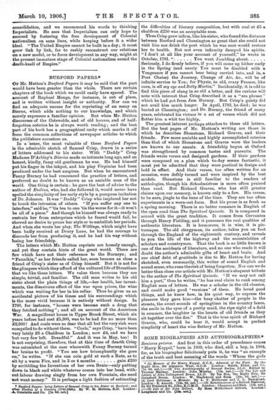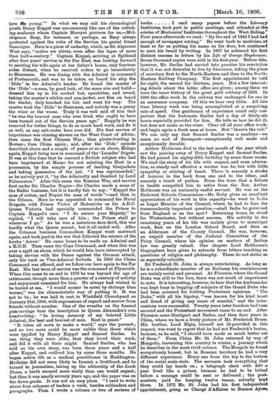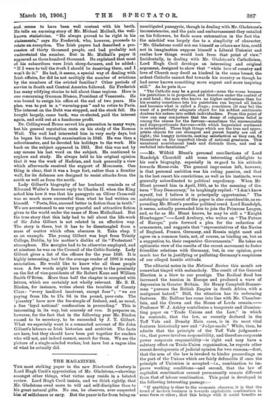SOME BIOGRAPHIES AND AUTOBIOGRAPHIES.* Seniores priores. And first in this
order of precedence comes "Harry Keppel," born in 1809, who died, still a boy, in 1904, for, as his biographer felicitously puts it, be was "an example of the truth and beet meaning of the words 'Whom the gods
• (1) Memoir of Sir Henry %appal, G.C.B., Admiral of the Fleet. By the Bight Hon. Sir Algernon West, G.C.B. London : Smith. Elder. and Co. [7e. 6d. net.]—(2) The Autobiography of Samuel Smiles, LL.D. Edited by Thomas Mackay. London: John Murray. [15e. net. J—(3) The Life and Letters of John Collingl000d Bruce, LL.D. By his Son, the Eight Hon. Sir Gaimdord Bruce. London : W. Blackwood and Bona. [10s. ed. net.]— (4) Lord Hobhouss : a Memoir. By L. T. Hobhouse and J. L. Hammond. London : E. Arnold. [12e. 65. net. —(5) Reminiscences of a Retired Diplomat. By Sir Frederick St. John,. London : Chapman and Han. [15e. net.] —(6) Life of Sir John Gilbert. By Boss Mulholland Oilbert. London : Longsnan.s and Co. [12a :zeta
love die young." In what we may call his chronological youth Henry Keppel was uncommonly like one of the rollick- ing seafarers whom Captain Alarryat pictures for us,—Mid-
shipman Easy, for instance, or perhaps, as Easy always protested against the rules of the Service, his genial friend
Gascoigne. Here is a piece of audacity, which, as Sir Algernon West says, "makes me shiver, even after the lapse of more than half-a-century." Captain Keppel. arriving at Spithead after four years' service in the Far East, was looking forward to meeting his wife again at her father's house, only fourteen miles distant, when he received orders to go immediately
to Sheerness. He was dining with the Admiral in command at Portsmouth, and was to be taken on board his ship the Dido ' in the Admiral's tender. He found the master of the Dido '—a man, by good luck, of the same size and build— dressed him up in his cocked hat, epaulettes, and sword, taking the master's oilskin and pea-jacket, saw him on board the tender, duly touched his hat, and went his way. The master took the Dido ' to Sheerness, and nobody was a penny the wiser or the worse. Truly it was well said of him that "he was the bravest man who ever lived, who ought to have been turned out of the Service years ago." Happily he was reserved for better things, to do as much hard work, and do it as well, as any salt-water hero ever did. His first service of importance was chasing slavers on the West Coast of Africa; then came the first Chinese War ; then pirate-hunting in Borneo ; then China again ; and, after the Dido ' episode described above and a couple of years or so on shore, Malaya again, Keppel being now in command of the Leander' frigate. It was at this time that he rescued a British subject who had been imprisoned at Macao for not saluting the Host in a procession, by the simple process of landing bluejackets and taking possession of the jail. "I was reprimanded," as he naively put it, "by the Admiralty and thanked by Lord Palmerston." After this came the Russian War, and service first under Sir Charles Napier—Sir Charles made a mess of the Baltic business, but it is hardly fair to say : "Keppel the man of action, and Napier the man of words "—and then in the Crimea. Here he was appointed to command the Naval Brigade, with Prince Victor of Hohenlohe as his A.D.C. Queen Victoria had specially commended the Prince to Captain Keppel's care. "I do assure your Majesty," he replied, "I will take care of him ; the Prince shall go wherever I go." As he was a notorious dare-devil, this was hardly what the Queen meant; but it all ended well. After the Crimean business Commodore Keppel went eastward again, and took part in the war that followed the seizure of the lorcha Arrow.' He came home to be made an Admiral and a K.C.B. Then came the Cape Command, and when this was over a spell on shore, which he would fain have interrupted by taking service with the Danes against the German attack, only his rank as Vice-Admiral forbade. In 1866 the China Command was offered, and we follow our hero again to the Far East. His last term of service was the command at Plymouth. When this came to an end in 1876 he was beyond the age of retirement, though more than a quarter of a century of activity and enjoyment remained for him. He always had wished to be buried at sea. "I would sooner be eaten by shrimps than worms," was his characteristic way of putting it. It was not to be ; he was laid to rest in Winkfield Churchyard on January 21st, 1904, with expressions of regard and sorrow from friends without number. One of the wreaths on the funeral gun-carriage bore the inscription in Queen Alexandra's own handwriting : "In loving memory of my beloved Little Admiral, the best and bravest of men. Rest in peace."
"It takes all sorts to make a world," says the proverb ; and no two sorts could be more unlike than those which were typified by Henry Keppel and Samuel Smiles. In one thing they were alike, that they loved their work, and did it with all their might. Samuel Smiles, who has told us his own story, was born three years and a half after Keppel, and outlived him by some three months. He began active life as a medical practitioner in Haddington. Medicine did not seem likely to furnish a livelihood, and he turned to journalism, taking up the editorship of the Leeds Times, a berth secured more easily than one would expect; but then it was nearly seventy years ago, and the paper was on the down-grade. It was not an easy place. "I used to write abour four columns of leaders a week, besides subleaders and paragraphs. Then I wrote a column or two of reviews of books I read many papers before the Literary Institutes, took part in public meetings, and attended at the soirees of Mechanics' Institutes throughout the West Riding." Four years afterwards we read : "By the end of 1842 I had had enough of newspaper editing." He went back to medicine, at least so far as putting his name on his door, but continued to earn his bread by writing. In 1857 he achieved his first distinct success in letters by his Life of George Stephen.son. Seven thousand copies were sold in the first year. Before this, however, Mr. Smiles had carried into practice his conviction that it was not desirable to live by literature, taking the place of secretary first to the North-Eastern and then to the South- Eastern Railway Company. The first appointment he bold for eight, the second for thirteen, years. Not a few interest- ing details about the latter office are given ; among them we have the inner history of the great gold robbery of 1855. In 1866 the office work in the railway was exchanged for one in an assurance company. Of this we hear very little. All this time literary work was being accomplished at a surprising rate of speed. One gentleman of experience could only con- jecture that the fortunate Smiles had a day of thirty-six hours especially provided for him. He tells us how he did it, but does not make us the wiser. Clear off all your office work, and begin again a fresh man at home. But "there's the rub." We can only say that Samuel Smiles was a machine—we mean no sort of disrespect—exceptionally well made and exceptionally durable.
Arthur Hobhouse died in the last month of the year which saw the passing away of Henry Keppel and Samuel Smiles. He had passed his eighty-fifth birthday by some three weeks. We read the story of his life with respect, and even admira- tion, so steady and effective a worker was he, but with little sympathy or stirring of heart. There is scarcely a stroke of humour in the book from one end to the other, and scarcely a touch of pathos. From the time that a failure in health compelled him to retire from the Bar, Arthur Hobhouse was an eminently useful servant. He was on the Endowed Schools Commission—Mr. Roby gives an excellent appreciation of his work in this capacity—he went to India as Legal Member of the Council, where he had to face the transcendently important question,—shall India be governed from England or on the spot ? Returning home, he stood for Westminster, but without success. His activity in the remaining years of his life was mainly given to municipal work, first on the London School Board, and then as an Alderman of the County Council. He was, however, an unpaid member of the Judicial Committee of the Privy Council, where his opinion on matters of Indian law was greatly valued. One chapter Lord Hobhouse's biographers have given to extracts from letters touching on questions of religion and philosophy. These do not strike us as especially valuable.
Sir Frederick St. John is always entertaining. As long as he is a subordinate member of an Embassy his reminiscences are mainly social and personal. At Florence, where the Grand Duke was still to the fore, there was not much of importance to note. It is interesting, however, to hear that the Ambassador was kept busy in begging off subjects of the Grand Duke who had been arrested for holding Protestant opinions. "The Duke," with all his bigotry, "was known for his kind heart and dread of giving any cause of scandal," and the inter- cessions were successful. Twenty years later freedom had been secured and the Protestant movement came to an end. After Florence came Stuttgart and Baden, and then four years in China, where we have a lively picture of Mr. Frederick Bruce. His brother, Lord Elgin, himself not ill-provided in this respect, was wont to regret that he had not Frederick's brains, because, as he said, "I should have made so much better use of them." From China Mr. St. John returned by way of Mongolia, traversing this country in winter, a journey which he describes in the most vivid colours. The Mongols he found scrupulously honest, but in Russian territory he had a very different experience. Every one from the top to the bottom of the social scale stole. The servants took everything that they could lay hands on ; a telegraph clerk with 260 .a year lived like a prince, because he had to be bribed before a message could be sent or delivered ; the post- masters, paid for keeping twelve teams, actually kept three. In 1872 Mr. St. John had his first independent appointment, going as Charge d'Affaires to Buenos Ayres,
and. seems to have been well content with his berth. lIntells an amusing story of _Mr. Michael Mulhall, the well- known statistician. "He always proved to be right in his statements," says Sir Frederick, .who, however, proceeds. to relate an exception. The Irish papers had described a pro- cession of thirty thousand people, and had probably not understated the number. But in Mr. Mulhall'a paper it appeared as three hundred thousand. He explained that most of. his subscribers were Irish sheep-farmers, and he added : "If I were to tell the truth I should be deceiving them, and I won't do it." He had, it seems, a special way of dealing with. Irish affairs, for did he not multiply the number of evictions by the numbers of the evicted families ? Other periods of service in South and Central America followed. Sir Frederick has many edifying stories to tell about these regions. Here is one concerning Guzman Blanco, President of Venezuela. He was bound to resign his office at the end of two years. His plan was to put in a." warming-pan" and to retire to Paris. The interest on the Debt was stopped, and the stock fell. He bought largely, came back, was re-elected, paid the interest again, and sold out at a handsome profit.
Dr. Collingwood Bruce served his generation in 'manyways, but his general reputation rests on his study of the Roman Wall. The wall had interested him in very early days, but he began his thorough examination in 1848. He was then a schoolmaster, and he devoted his holidays to the work. His book on the subject appeared in 1851. But this was not by any means his last word on the subject. He continued to explore and study. He always held to his original opinion that it was the work of Hadrian, and took generally a view which afterwards received the support of Mommaen. One thing is clear, that it was a huge fort, rather than a frontier wall, for its defences are designed to resist attacks from the south as well as from the north.
Lady Gilbert's biography of her husband reminds us of Edmund Waller's famous reply to Charles II. when the King asked him how it was that his panegyric on Oliver Cromwell was so much more successful than what he had written on himself. "Poets, Sire, succeed better in fiction than in truth." We are accustomed to see very graceful and attractive fiction given to the world under the name of Rosa Mulholland. But the true story that this lady had to tell about the life-work of Sir John Gilbert is not related in an effective way. The story is there, but it has to be disentangled from a mass of matter which often obscures it. Take chap. 2 as an example. The young Gilbert was kept from Trinity Cbllege, Dublin, by his mother's dislike of its " Protestant " atmosphere. His energies had to be otherwise employed, and at nineteen he was on the Council of the Celtic Society. Lady Gilbert gives a list of the officers for the year 1848. It is highly interesting, but for the average reader of 1906 it wants annotation.. He would like to know who all these people were. A few words might have been given to the proximity on the list of vice-presidents of Sir Robert Kane and William Smith O'Brien. More than half the chapter is occupied with letters, which are certainly not wholly relevant. Mr. S. H. Bindon, for instance, writes about the troubles of County Clare "every landlord insolvent, except four " ; "we are paying from 12s. to 17s. 8d. in the pound, poor-rate. The pisantry ' have now the fee-simple of Ireland, and, as usual, a _fine loyal national' confiscation is proceeding." This is interesting in its way, but scarcely ad rem. It prepares us, however, for the fact that in the following year Mr. Bindon ceased to be secretary, to be succeeded by J. T. Gilbert. 'What we especially want is a connected account of Sir John Gilbert's labours as Irish historian and archivist. The facts are here, but they should have been put together for readers who will not, and indeed cannot, search for them. We see the picture of a single-minded worker, but have but a vague idea of what he actually did.












































 Previous page
Previous page